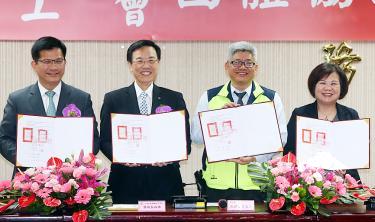
The Taiwan Railways Administration (TRA) yesterday signed a collective agreement with the Taiwan Railway Labor Union after nearly 30 years of negotiations.
The agreement was signed by TRA Director-General Chang Cheng-yuan and union chairman Chang Wen-cheng, with Minister of Transportation and Communications Lin Chia-lung and Minister of Labor Hsu Ming-chun serving as witnesses.
The agreement, signed following 300 rounds of negotiations, is a landmark moment for the railway industry and the union, Lin said, adding he was honored to witness the event.
The two parties would become official partners following the agreement, he said.
“The problems related to salaries, paid leave or other personnel issues might not be resolved overnight, but mutual trust between the agency and union would lead to good results. We are making progress incrementally, but I would continue to work you all to resolve these issues,” he said, adding that the TRA has his support.
Hsu said the TRA is a government agency and therefore subject to government regulations, which makes the signing of collective agreements a challenging task.
It was the perseverance of the union and the TRA that made the agreement possible, she said.
Chang Cheng-yuan said that the agreement was a historic moment in 132 years of the agency’s history.
“I was the station master of Taipei Railway Station when the agency and the union started discussing signing a collective agreement. Now I am the bureau’s director-general, and it has finally come true,” he said.
The two sides finalized the wording of the agreement on July 31, he added.
The agreement would ensure that workers’ rights are protected and that work environments would be improved, including how shifts are scheduled, rules governing the implementation of paid leave and guidelines for compensation for working overtime and on holidays.
Regarding the difficulty of signing the agreement, Chang Wen-cheng said he was one of the representatives attending the first rounds of negotiations in 1989. At the time, the union was controlled by the Chinese Nationalist Party (KMT), he said, adding that any document had to first be approved by the party.
Neither the Ministry of Labor nor the TRA were active in promoting the signing of the agreement, he said, adding that it was almost impossible to negotiate the agreement at that time.
Between 1990 and 2000, the union has held large-scale protests, as the TRA and the ministry were strict in reviewing the union’s demands. They would often offer excuses, such as claiming there was no precedent, to reject the union’s demands.
In response to media queries asking if the agreement means there would not be any strikes from railway employees during national holidays in the future, Lin said that more harmonious labor relations would help the agency to reform its operations, which began after the derailment of Puyuma Express No. 6432 in Yilan last year.
Not only would it lower the chances of labor strikes, it would also help the agency follow labor regulations, he said.
“The agency has various systems to reward its employees. We want to make sure the technical issues related to raising salaries and bonuses would fulfill legal requirements and would not diminish the morale of the employees,” Lin said.